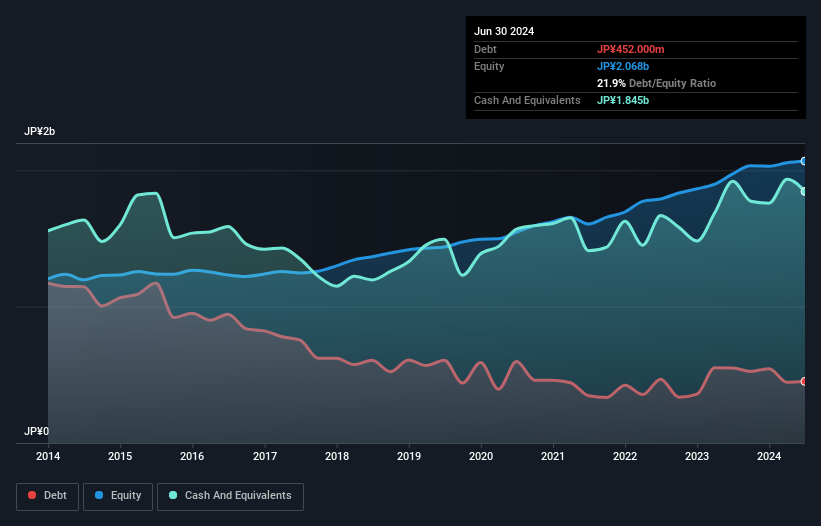- Japan
- /
- Commercial Services
- /
- TSE:4664
We Think Japan Reliance Service (TSE:4664) Can Manage Its Debt With Ease

The external fund manager backed by Berkshire Hathaway's Charlie Munger, Li Lu, makes no bones about it when he says 'The biggest investment risk is not the volatility of prices, but whether you will suffer a permanent loss of capital.' It's only natural to consider a company's balance sheet when you examine how risky it is, since debt is often involved when a business collapses. We note that Japan Reliance Service Corporation (TSE:4664) does have debt on its balance sheet. But is this debt a concern to shareholders?
Why Does Debt Bring Risk?
Debt and other liabilities become risky for a business when it cannot easily fulfill those obligations, either with free cash flow or by raising capital at an attractive price. If things get really bad, the lenders can take control of the business. However, a more frequent (but still costly) occurrence is where a company must issue shares at bargain-basement prices, permanently diluting shareholders, just to shore up its balance sheet. By replacing dilution, though, debt can be an extremely good tool for businesses that need capital to invest in growth at high rates of return. When we think about a company's use of debt, we first look at cash and debt together.
See our latest analysis for Japan Reliance Service
What Is Japan Reliance Service's Net Debt?
The image below, which you can click on for greater detail, shows that Japan Reliance Service had debt of JP¥452.0m at the end of June 2024, a reduction from JP¥550.0m over a year. However, its balance sheet shows it holds JP¥1.85b in cash, so it actually has JP¥1.39b net cash.

A Look At Japan Reliance Service's Liabilities
We can see from the most recent balance sheet that Japan Reliance Service had liabilities of JP¥1.12b falling due within a year, and liabilities of JP¥888.0m due beyond that. Offsetting this, it had JP¥1.85b in cash and JP¥894.0m in receivables that were due within 12 months. So it actually has JP¥727.0m more liquid assets than total liabilities.
This excess liquidity is a great indication that Japan Reliance Service's balance sheet is almost as strong as Fort Knox. With this in mind one could posit that its balance sheet means the company is able to handle some adversity. Simply put, the fact that Japan Reliance Service has more cash than debt is arguably a good indication that it can manage its debt safely.
The modesty of its debt load may become crucial for Japan Reliance Service if management cannot prevent a repeat of the 23% cut to EBIT over the last year. When it comes to paying off debt, falling earnings are no more useful than sugary sodas are for your health. There's no doubt that we learn most about debt from the balance sheet. But you can't view debt in total isolation; since Japan Reliance Service will need earnings to service that debt. So if you're keen to discover more about its earnings, it might be worth checking out this graph of its long term earnings trend.
Finally, while the tax-man may adore accounting profits, lenders only accept cold hard cash. Japan Reliance Service may have net cash on the balance sheet, but it is still interesting to look at how well the business converts its earnings before interest and tax (EBIT) to free cash flow, because that will influence both its need for, and its capacity to manage debt. Over the last three years, Japan Reliance Service recorded free cash flow worth a fulsome 82% of its EBIT, which is stronger than we'd usually expect. That puts it in a very strong position to pay down debt.
Summing Up
While we empathize with investors who find debt concerning, you should keep in mind that Japan Reliance Service has net cash of JP¥1.39b, as well as more liquid assets than liabilities. And it impressed us with free cash flow of JP¥318m, being 82% of its EBIT. So we don't think Japan Reliance Service's use of debt is risky. When analysing debt levels, the balance sheet is the obvious place to start. But ultimately, every company can contain risks that exist outside of the balance sheet. For example - Japan Reliance Service has 3 warning signs we think you should be aware of.
At the end of the day, it's often better to focus on companies that are free from net debt. You can access our special list of such companies (all with a track record of profit growth). It's free.
New: Manage All Your Stock Portfolios in One Place
We've created the ultimate portfolio companion for stock investors, and it's free.
• Connect an unlimited number of Portfolios and see your total in one currency
• Be alerted to new Warning Signs or Risks via email or mobile
• Track the Fair Value of your stocks
Have feedback on this article? Concerned about the content? Get in touch with us directly. Alternatively, email editorial-team (at) simplywallst.com.
This article by Simply Wall St is general in nature. We provide commentary based on historical data and analyst forecasts only using an unbiased methodology and our articles are not intended to be financial advice. It does not constitute a recommendation to buy or sell any stock, and does not take account of your objectives, or your financial situation. We aim to bring you long-term focused analysis driven by fundamental data. Note that our analysis may not factor in the latest price-sensitive company announcements or qualitative material. Simply Wall St has no position in any stocks mentioned.
About TSE:4664
Japan Reliance Service
Provides various security, building maintenance, human resource, general construction, condominium management services in Japan.
Excellent balance sheet average dividend payer.
Market Insights
Community Narratives



